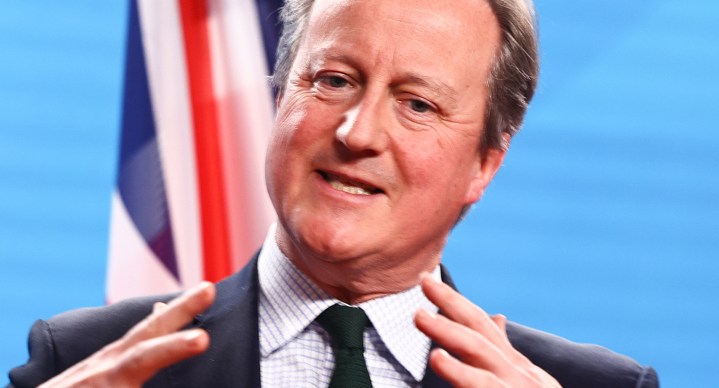MIDDLE EAST CRISIS UPDATE: 10 APRIL 2024
Turkey and Israel swap trade threats; UK won’t block arms sales to Jewish state – Cameron

Turkish President Recep Tayyip Erdoğan, facing growing criticism at home for maintaining trade ties with Israel amid its ongoing war on Hamas, on Tuesday imposed restrictions on the export of dozens of items to the Jewish state. Israel’s foreign minister answered with a threat to block the import of other Turkish products.
Turkey’s exports to Israel slumped by an annual 28% to $1.9-billion during the first five months of the war, data from the Turkish Statistics Office show.
The UK government will keep on selling arms to Israel after reviewing advice from the nation’s lawyers, Foreign Secretary David Cameron said.
Turkey, Israel swap trade threats with Gaza tension rising
Turkey’s decision to restrict exports to Israel for opposing its proposal to drop aid over the Gaza Strip drew a swift retaliatory response, further straining already tense relations between the one-time military allies.
Turkish President Recep Tayyip Erdoğan, facing growing criticism at home for maintaining trade ties with Israel amid its ongoing war on Hamas, on Tuesday imposed restrictions on the export of dozens of items to the Jewish state. Israel’s foreign minister answered with a threat to block the import of other Turkish products.
Before the fighting in Gaza erupted in October, Erdoğan and Israeli Prime Minister Benjamin Netanyahu were exploring ways to increase cooperation in energy and trade, and advance a nascent thaw in relations after more than a decade of tensions. Both were seeking a broader rapprochement with other Middle Eastern states as Russia’s invasion of Ukraine triggered a geopolitical shift in the region by disrupting supply chains and commodity markets.
Now the improved diplomacy has been derailed along with bilateral trade, which was largely spared even after ties hit a low after a 2010 Israeli raid on a Turkish flotilla headed to Gaza.
Turkey’s exports to Israel slumped by an annual 28% to $1.9-billion during the first five months of the war, data from the Turkish Statistics Office show. Manufactured goods, which include construction materials, are the biggest component — representing a third of the $714-million shipped in the first two months of the year.
Israel’s total gross import of goods in 2023 was $91-billion, of which $4.6-billion came from Turkey — making it the country’s fifth-largest supplier.
Erdoğan’s move came after thousands of Islamist protesters denounced him over the weekend for maintaining trade with Israel. The demonstrations took place a week after the president suffered a historic defeat in local elections marked by similar criticism from grassroots conservative voters, who supported a rival Islamist party that took a harder line against Israel.
Turkey’s Trade Ministry announced a ban on the shipment of 54 items, including products that could be used for military purposes and construction materials like cement, steel, iron and aluminium. Israel’s foreign minister, Israel Katz, fired back with a pledge to draft an extensive list of additional Turkish goods that Israel will stop importing and even appealed to his nation’s allies, including the US, to stop investing in Turkey. The Turkish lira weakened.
Turkey’s “decision will remain in effect until Israel declares an immediate ceasefire in Gaza and allows a sufficient and uninterrupted flow of humanitarian aid to the Gaza Strip,” the Trade Ministry said, accusing Israel of condemning Palestinians to hunger.
Foreign Minister Hakan Fidan said late on Monday that Israel rejected a request by the Turkish Air Force to parachute aid packages into Gaza, and vowed to “take a series of measures” in response.
Israel accused Turkey of supporting Hamas as the two nations remain divided over the status of Palestinian territories. Turkey is a Nato member, but unlike the US and the European Union doesn’t consider Hamas a terrorist organisation. Erdoğan has called the group’s militants “freedom fighters”, though he’s stopped short of cutting ties with Israel altogether.
“Erdoğan is once again sacrificing the economic interests of the people of Turkey for his support of Hamas,” Katz said.
The Manufacturers Association of Israel said Turkey’s actions would reinforce its efforts to reduce dependence on imports.
A ban on the import of Turkish cement in particular could be a major concern, as Israel has only a single operating cement factory of its own. That could increase pressure on Israel’s construction sector, of which large parts are at a standstill due to its heavy reliance on Palestinian workers.
Turkey and Israel have previously held joint military exercises, but relations frayed when Israel invaded Gaza in December 2008. Erdoğan, whose party has Islamist roots, accused the Jewish state of using excessive force and his administration cancelled military ties and backed the Palestinian bid for statehood.
UK position on selling arms to Israel is unchanged – Cameron
The UK government will keep on selling arms to Israel after reviewing advice from the nation’s lawyers, Foreign Secretary David Cameron said.
“I have now reviewed the most recent advice about the situation in Gaza and Israel’s conduct of their military campaign,” Cameron said at a news conference in Washington alongside US Secretary of State Antony Blinken. “The latest assessment leaves our position on export licences unchanged. This is consistent with the advice that I and other ministers have received.”
He said that he would not comment on any legal advice he had received.
Cameron’s response comes after increased pressure from opposition parties and some members of Prime Minister Rishi Sunak’s governing Conservatives to outline whether or not UK government lawyers judge Israel is breaching international humanitarian law in Gaza, in the wake of last week’s Israeli strike that killed seven aid workers, including three Britons. DM




















Bloomberg’s reporting on the Israel-Palestine war is great if you want a blow by blow account. But you can read it every day and still not have a clue about what is going on. But that’s not new. I had the same experience reading the Cape Times decades ago.
Consider the limitations of only relying on government sources when reporting as Bloomberg has done when quoting Cameron that the UK position on selling arms to Israel is unchanged based on legal opinion obtained.
The Guardian however notes that “Three former supreme court justices, including the court’s former president Lady Hale, are among more than 600 lawyers, academics and retired senior judges warning that the UK government is breaching international law by continuing to arm Israel”.
But really, anyone paying attention to the scenes of utter devastation must surely wonder if not about the legality of supplying arms to Israel and the legal constructs which would make such actions permissible, then about the morality of it.
Secondly, we would do well do recall that the arms deal involved British and German arms manufacturers who were happy to undermine our new democracy with the support of the like of Tony Blair (according to Andrew Feinstein). I would not expect much morality from war profiteers
Not much morality from anyone involved in destroying Iraq and its people either. They still haven’t found the weapons of mass destruction, even though they saw it fit to use their own ones in Iraq. Bush, Blair, any comments please.
Interesting comments “…anyone paying attention to the scenes of utter devastation must surely wonder if not about the legality of supplying arms to Israel and the legal constructs which would make such actions permissible, then about the morality of it.”
Now go back to Oct 7, apply the same objective lens and language, substitute “Iran” and/or “Hamas” for “Israel”, and recalibrate that sanctimonious moral compass.
Your twisted logic suggests that the UK provides arms to Hamas and/or Iran.
October 7 was terrible, it cannot justify the Israeli response which has been excessive, motivated by revenge and has deliberately targeted the civilian population.
Perhaps you should “recalibrate that sanctimonious moral compass.”
Who are you to say what can or cannot justify any response, let alone to speak for Israel’s motivations? Israel has consistently stated its motivations are to eliminate Hamas and to return the hostages. I refer you back to your sanctimonious, uncalibrated moral compass.
Your comments are erroneous. This is from yesterday’s Law Gazette (UK)
The measures against Israel is based on a mistaken reading of the ICJ ruling on genocide, according to a letter of riposte. A new letter has attracted more than 1,330 signatures, responding to last week’s letter signed by 613 lawyers, calling for a halt on arms exports to Israel. That letter cited a provisional order of the ICJ which it said ‘concluded that there was a plausible risk of genocide in Gaza’.
The new letter states that the quote is incorrect: the ICJ’s provisional measures order that Palestinians in the Gaza Strip ‘have plausible rights to be protected from acts of genocide. The court’s ability to issue a provisional measures order depends on a finding that the rights asserted by the party seeking the order are at least plausible. It is of course plausible that Palestinians in the Gaza Strip have rights to be protected from acts of genocide. Thus, it is the rights of the Palestinians in the Gaza Strip that were determined to be plausible, and not the alleged commission of genocide against them.’
The original letter claims wrongly that the ICJ’s order places legal obligations on the UK. Rather, it is binding only on the parties to the proceedings: Israel and SA. The letter is also criticised for relying on figures supplied by Hamas-run Ministry of Health
‘There is growing number of legal experts urging to ignore calls for an arms embargo based on erroneous legal claims and Hamas propaganda’